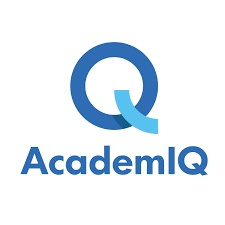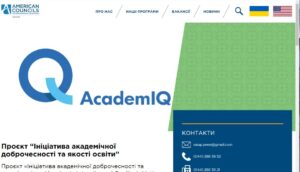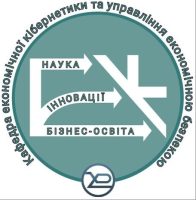NURE received the Academiq IQ certificate

12.07.2022. The two-year project to promote academic excellence and quality of education Academiq IQ has been successfully completed at the Kharkiv National University of Radio Electronics. The project was administered by the American Councils for International Education with the assistance of the U.S. Embassy in Ukraine, the Ministry of Education and Science of Ukraine, the National Agency for Higher Education Quality Assurance.
NURE will take part in an international project “Academic IQ Initiative”

At the end of 2020, based on the results of a competitive selection, Kharkiv National University of Radio Electronics will participate in the international project “Academic IQ Initiative”, funded by the US State Department through the US Embassy in Ukraine. Rector of NURE Valerii Semenets has already signed a Memorandum of Understanding between NURE and the American Councils for International Education: ACTR/ACCELS.
The purpose of the project is to implement policies and practical mechanisms to prevent and combat violations of the principles of academic integrity and to develop mechanisms for internal quality assurance of education. One of the key tasks of the Project is to provide educational and technical support to the staff of internal education quality assurance centers of HEIs or their counterparts in creating an effective model for monitoring the quality of education, identifying key problems and causes of violations of academic integrity by participants of the educational process, and providing expert recommendations for improving the quality of education in HEIs.
Academic Integrity
One of the main tasks of the Education Law is to improve the legal mechanisms for the implementation of the constitutional right of citizens to equal access to quality education at all levels; creation of conditions for the person’s education throughout life (the introduction of such types of education as formal, non-formal and informal); improving the regulatory framework of education, including the development of the latest programs aimed at modernizing the system of retraining, advanced training and internships for teachers, scientific and pedagogical workers and heads of educational institutions.
Academic integrity is a set of ethical principles and statutory rules that should guide the participants in the educational process during the studying, teaching and implementation of scientific (creative) activities in order to ensure confidence in learning outcomes and / or scientific (creative) achievements.
Compliance of academic integrity by pedagogical, scientific- pedagogical and scientific workers involves:
links to sources of information in the case of using ideas, statements, information;
compliance with copyright laws;
providing reliable information on research results and own pedagogical (scientific, pedagogical, creative) activities;
monitoring compliance of academic integrity by education applicants.
Compliance of academic integrity by education applicants provides:
independent performance of educational tasks, tasks of the current and final control of learning outcomes (for people with special educational needs, this requirement is applied taking into account their individual needs and capabilities);
links to sources of information in the case of using ideas, statements, information;
compliance with copyright laws;
providing reliable information about the results of their own educational (scientific, creative) activities.
Violation of academic integrity is considered:
academic plagiarism – the publication (partially or fully) of scientific (creative) results obtained by other persons, the results of their own research (creativity), and / or reproduction of published texts (published works) of other authors without attribution; the form of academic plagiarism is self-plagiarism, which consists in reproducing without reference to the source of information their own previously published texts;
fabrication – falsification of research results, references, or any other data relating to the educational process;
fraud – the provision of knowingly untruthful information regarding their own educational (scientific, creative) activities or the organization of the educational process;
cheating – the use of external information sources without appropriate permission during the assessment of learning outcomes;
bribery – the provision (receipt) by a participant of the educational process or a proposal regarding the provision (receipt) of monetary funds, property or services of material or intangible nature in order to obtain illegitimate benefits in the educational process.
For violation of academic integrity pedagogical, scientific- pedagogical and scientific workers of educational institutions may be get involved to such academic responsibility:
refusal to award a scientific degree or assigning a scientific rank;
deprivation of an awarded scientific degree or assigned academic rank;
deprivation of the right to participate in the work of determined by the law bodies or to occupy positions defined by the law.
For violation of academic integrity, education applicants may be get involved to such academic responsibility:
repeated passing of assessment (test, exam, test, etc.);
repeated passing of a training course;
deductions from educational institutions (except for persons receiving general secondary education).
The procedure of checking the certification works for obtaining a master’s degree on academic plagiarism is realized according to the following documents:
- Regulation on the certification work of higher education applicants at the second (master’s) level (KNURE Order from 11/01/2019 No. 419).
- Regulation on academic plagiarism counteraction in KNURE (KNURE Order from 04/28/2017, 290).
- Instructions on the checking procedure of certification works for obtaining a master’s degree for academic plagiarism ( KNURE Order from 03/29/2019 No. 51Р).

